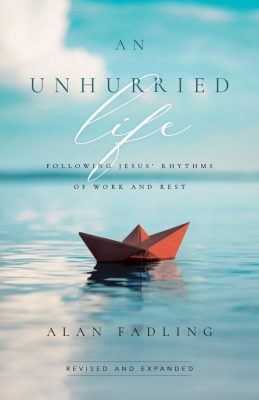By Alan Fadling–
Holy leisure and unholy idleness are polar opposites. This sort of idleness isn’t life-giving. It isn’t good. It isn’t God’s way. But I am recommending that we consider stepping off the treadmill or out of the fast lane long enough to relax and linger in God’s presence, to walk with him at his pace. This isn’t being lazy.
Jesus himself knew how to get out of the fray so he could linger with the Father. Remember our one-word description of Jesus? Relaxed—and relaxed is not the same as sleepy. Relaxed can be very attentive and engaged. A sprinter standing in the starting blocks is both ready and relaxed at the same time. Jesus modeled for us not only how to withdraw and linger in God’s presence, but also how to relax in it.
Despite this divine precedent and example, we’re often tempted to think that unhurry equals laziness. For example, Gerald May suggests that our efficiency-orientation makes unhurried times for rest feel selfish, irresponsible and lazy: “We know we need rest, but we can no longer see the value of rest as an end in itself; it is only worthwhile if it helps us recharge our batteries.” Unhurry and laziness are not equivalents. Jesus was unhurried, but he was not lazy. He was engaged, hardworking, purposeful and conscientious.
Brenda Ueland helps us distinguish between healthy unhurry and empty idleness:
If your idleness is a complete slump, that is, indecision, fretting, worry, or due to overfeeding and physical mugginess, that is bad, terrible and utterly sterile. Or if it is that idleness which so many people substitute for creative idleness, such as gently feeding into their minds all sorts of printed bilge like detective stories and newspapers, that is too bad and utterly uncreative.
Unholy unhurry is sterile, empty and lifeless rather than fruitful, significant and life-giving.
Another form of unholy unhurry that many of us have heard little about is acedia. Derived from the Greek a (for “not”) and keedos (meaning “to care”), acedia is ultimately a failure of love. It’s a place of apathy toward life and a kind of spiritual boredom; it’s that umpteenth lap somewhere between the enthusiasm of the starting line and the celebration of the finish line. Whether midday, midlife, halftime or halfway through a big project, we’re tempted to give in, give up or distract ourselves.
Acedia tempts us to abandon the life we have for some imagined better option somewhere else—as in “anywhere but here”! Acedia can also be the temptation to live our lives in imagined fantasies of what might be rather than living in the gift of what is. Though it may seem unhurried from a certain perspective, acedia is rooted in a restless, distracted and, yes, hurried heart.
In Acedia and Me, Kathleen Norris suggests the likelihood “that much of the restless boredom, frantic escapism, commitment phobia and enervating despair that plague us today is the ancient demon of acedia in modern dress.” Sound familiar?
Evagrius Ponticus, a fourth-century monk who offered key insights into acedia, described those afflicted as feeling that the “sun hardly moves and that the day is fifty hours long; the monk constantly looks out the window, walks around outside, peers at the sun to figure out how long until dinner time; there arises a dislike for the place, for the monastic life, for work; the monk thinks that love has fled from among the brothers and that there is no one to provide any encouragement.”
Acedia tempts us to camp in lethargic fantasy or rush along to some imagined “grass is greener” meadow. Anything but here and now. It’s a kind of soul-weariness in the midst of our journey, a loss of holy desire that would energize the practices by which we make open space and unhurried time in our life so we notice the real presence of God. He is always with you and me, yet we don’t always remain aware of this most basic of spiritual facts. We behave too often as though God either isn’t present or is so distant that his presence is irrelevant.
A spiritual malaise, acedia causes us to find spiritual disciplines boring and not worth our time. It is a loss of a more eternal perspective: we forget that we are living eternal life now. Living each moment in the light of eternity enables us to remain unhurried and engaged in the work God has for us in the present moment. We human beings are easily tempted to escape our responsibilities and, for that matter, to suppress any responsiveness to God. Our “I don’t feel like it” is an unholy indifference.
Since acedia is a failure to appreciate the gifts of the present moment or the present season, the classic remedy for acedia has always been to abide in the good relationships and to engage in the good work before us. We counter acedia’s enticement to seek some unknown better that lies anywhere but here with an intentional and positive focus on the present. Benedictine professor Columba Stewart says that “Benedict prescribes service of one another, mutual obedience, work, spiritual guidance and annual renewal in Lent as ways to keep monastic life grounded in the freshness of each moment.” These are ways of living and savoring the life we’ve been given rather than dreaming about or searching for a life we imagine as better than this one.
So, at its simplest, the opposite of acedia is love—devotion to Christ that produces active, sincere, engaged concern for others. If we let our thoughts wander, the sharpness of our holy concern will be dulled by lust, envy, greed or other unholy, lazy inward impulses.
These days, acedia sometimes sneaks up behind me, often in the middle of my day, and whispers something like, “Haven’t you done enough work on that presentation or that retreat? You’d be fresher tomorrow. Why don’t you check a few of your favorite websites? See what’s happening on Facebook and Twitter. See if anyone is visiting your blog. Take a little break with one of your favorite video games.” When I follow the unholy spiritual counsel acedia proposes, I end up in fruitless, joyless, lifeless places. I cease to engage in the hard, good work God prepared well in advance for this very day.
In contrast to the fruitlessness of acedia’s counsel, I find the fruitfulness of God’s Spirit a life-giving antidote. Just before Paul lists the fruit of the Spirit in Galatians 5, he offers a list of what our flesh—that element of us that has been formed in resistance and disconnection from the Spirit—promotes apart from the Spirit.
Love: Apart from the Spirit, I become disengaged and selfish, hating and being hated, uninvolved and uncaring. What do I really care about? Who really matters to me? Caring doesn’t hurry.
Joy: Apart from the Spirit, I become depressed, or I seek thrills instead of holy delight. I become slothful, even exhausted. I become narrowed in my perspective and cynical. Joy withers in my hurry to amuse myself. What will instead energize me and give me holy pleasure?
Peace: Apart from the Spirit, I become worried and anxious, hurried and stressed, frazzled and frayed. Where and when do I feel a deep sense of well-being and rest? Peace is a fruit of unhurriedness.
Patience: Apart from the Spirit, I easily lose my temper. In no time I become intolerant and irritated. I find that every little issue in the lives of others can provoke me. Patience is the opposite of hurry.
Kindness: Apart from the Spirit, I fail to offer even simple courtesy to others. I become mean, harsh and calloused. True kindness takes unhurried time.
Goodness: Apart from the Spirit, my goodness becomes self-righteousness. I find myself titillated by innuendo, mired in double-mindedness, unwholesome and unhealthy in my choices. Goodness is a fruit of unhurried communion with God, the only one who is good.
Faithfulness: Apart from the Spirit, I can become flaky, burned out and unreliable. Faithfulness is evident in unhurried commitment, a long obedience in the same direction.
Gentleness: Apart from the Spirit, I become sharp and harsh with others, demanding and unsympathetic. Gentleness isn’t in a harsh hurry.
Self-Control: Apart from the Spirit, I spin out of control. I become enslaved to pleasure, power and empty amusement. Self-control resists the rush to get what I crave.
The genuine productivity of the Spirit is the fruit of an unhurried orientation to God and to people. My life with God and my relationships with people need more unhurried time in order to be rooted in him and therefore fruitful. I see this truth in Nicodemus’s comment to Jesus: “No one could perform the [miraculous] signs you are doing if God were not with him” (John 3:2, NIV). Nicodemus recognized in the works of Jesus that God’s favor was with him. In fact, Nicodemus was seeing in Jesus both the works of the Father and the fruit of God’s Spirit.
Do you find yourself mired in the unholy unhurry of acedia? If you’re not sure, stop. Listen. Ask yourself, What is the good in this present moment that I can notice, acknowledge, enjoy and share with a trusted friend? What good work lies right here before me, disguised initially as something boring? Listen. Then step into that good work. Walk with God in it.
Taken from An Unhurried Life (Revised and Expanded) by Alan Fadling. Copyright (c) 2020 by Alan Fadling. Published by InterVarsity Press, Downers Grove, IL. www.ivpress.com

About the Author:
Alan Fadling is the author of “An Unhurried Life.”
Do Good:
- If you’d like to make a monetary donation, please click here to make a gift.
- Text ‘GIVE’ to 52000 to make a $10 donation to The Salvation Army. This will automatically add a one-time donation to your next mobile phone bill.
- For information about volunteering, please visit volunteer.usawest.org.
- To learn more about how to support The Salvation Army’s relief efforts, please click here.












